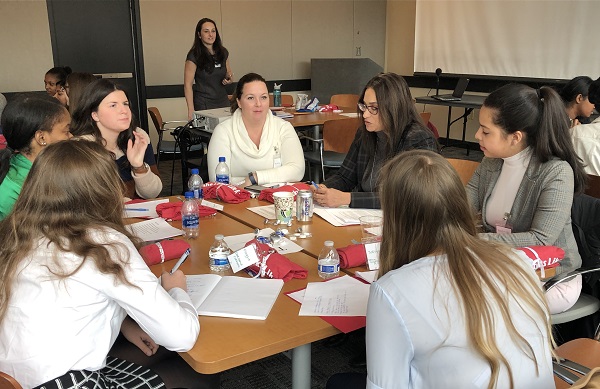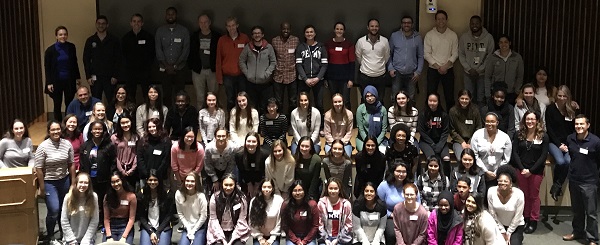
‘I Look Like a Cardiologist’ aims to close gender and racial gaps in medicine
Photo: A breakout session from the 2020 “I Look Like a Cardiologist” program.
What started as a casual conversation between Kathryn Berlacher and Diana Rodgers has blossomed into a rewarding partnership with the potential to help hundreds of Pittsburgh kids find their futures in medicine.
Berlacher, a practicing physician educator at the University of Pittsburgh Medical Center, and Rodgers, founding CEO of Fit Education Consulting, have offered the program “I Look Like a Cardiologist” to high school kids since 2018. UPMC’s Heart and Vascular Institute funds a shoestring budget of less than $5,000.
The two women, both champions of equity issues, nurtured the idea for the program they call “ILLC” after a conversation about gender and racial disparity in the field of medicine. The discussion included the broader need to help families whose kids might not have the same opportunities they’ve had in life.
“It’s where we thought we could make an impact,” Berlacher says. “There’s a lot of efforts that go on in higher education, but we thought that a lot of it starts at younger ages. Then we’re more likely to convince them to stay in the field of medicine as they get older.”
Including the 55 teens enrolled this year, 121 kids will have gone through the program. They meet for four one-hour sessions through January and follow up with mentoring throughout the year. The program recruits primarily girls but is offered to boys as well. ILLC has grown to include counties north of Pittsburgh to Erie, and east to Johnstown-Altoona. The program’s website explains how to apply.

To recruit students, Rodgers reaches out to science teachers, teachers of gifted and talented kids, and organizations such as FAME (Fund for Advancement of Minorities in Education) and The Pittsburgh Promise. Word of mouth sends some interested students their way, too.
“Unlike many of our students, I grew up with a father and grandfather who were physicians — they were both cardiologists — and this was a part of life,” says Berlacher, who runs UPMC’s Fellowship Program and Women’s Heart Program. “I loved science and talking with people, so I always had an interest.”
In college, she majored in women’s studies and has applied some of what she learned to the medical field. Disparities are wide. For example, only about 20 percent of practicing cardiologists in America are women.
“That’s concerning, both for us and, more broadly, for the field of cardiology and a lot of society,” Berlacher says. “Diversity in terms of gender and race is really important, but we also like to think about first generations in America, first-generation college students, families that wouldn’t have exposure to things” because of income or other factors.
Their secret weapon to making ILLC work: The fellows on UPMC faculty who assist with the program as mentors. The fellows report getting a lift from working with students, says Rodgers.
“They’re so incredibly generous with their time,” she says. “Each kid has a mentor, who spends time one-on-one meeting with them, really grounding everything in a personal connection.”
“It’s making it something that feels acceptable to the kids,” says Berlacher about the prospect of applying to med school. “They feel overwhelmed, they don’t know how to do it. It feels frustrating. All of those things are true, but as soon as you start to hear from someone who has been in the same place, you think, ‘Oh my gosh, that sounds like my story.’ We want to inspire this next generation of the workforce. We need to make sure the right people go into this field.”
Students form a bond with their mentors that lasts beyond their high school years. One student recently emailed Rodgers seeking advice about a college application and within minutes, she and Berlacher had connected someone with the student by phone.
Despite being virtual because of the pandemic, this year’s program drew the largest number of participants yet.
“The kids are so excited. They already adore their mentors, especially since our faculty are extraordinary at jumping into this stuff,” Rodgers says. “The kids were texting and emailing me to get the email addresses of other kids.”
Each week has a theme. The first is a cardiology crash course. Being a cardiologist goes beyond taking care of a patient’s heart — it involves research, community work, communication and interaction, says Berlacher.
“Some stuff they were really interested in, asking how we, as kids, can impact the heart health of our community, like healthy eating, good nutrition in school lunches, or advocating against vaping,” says Rodgers. “Engaging them empowers them with what they can do now, as well as how to get into this position long term.”
Other sessions emphasize a day in the life of a cardiologist, diversity and equity issues, and how to become a cardiologist. The themes are intertwined throughout the four weeks and include the details of planning for the future — how to get into college and then into medical school.
“Nothing is set in stone yet, except that we’ll continue to commit to this,” says Berlacher. “We plan to do it on an annual basis, post-pandemic, in person. While we are pulling it off virtually this year, we do hope for the best of both worlds in the future.”